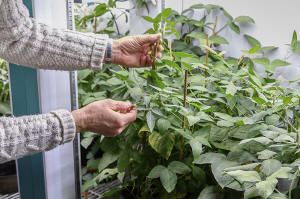The USAID shutdown is upending livelihoods for nonprofit workers,
farmers and other Americans
 Send a link to a friend
Send a link to a friend
 [February 19, 2025] By
ELLEN KNICKMEYER and HEATHER HOLLINGSWORTH [February 19, 2025] By
ELLEN KNICKMEYER and HEATHER HOLLINGSWORTH
WASHINGTON (AP) — There's the executive in a U.S. supply-chain company
whose voice breaks while facing the next round of calls telling
employees they no longer have jobs.
And a farmer in Missouri who grew up knowing that a world with more
hungry people is a world that’s more dangerous.
And a Maryland-based philanthropy, founded by Jews who fled pogroms in
Eastern Europe, is shutting down much of its more than 120-year-old
mission.
Beyond the impact of the Trump administration’s dismantling of the U.S.
Agency for International Development, some 14,000 agency employees and
foreign contractors as well as hundreds of thousands of people receiving
aid abroad — many American businesses, farms and nonprofits— say the
cutoff of U.S. money they are owed has left them struggling to pay
workers and cover bills. Some face financial collapse.
U.S. organizations do billions of dollars of business with USAID and the
State Department, which oversee more than $60 billion in foreign
assistance. More than 80% of companies that have contracts with USAID
are American, according to aid data company DevelopmentAid.

President Donald Trump stopped payment nearly overnight in a Jan. 20
executive order freezing foreign assistance. The Trump administration
accused USAID's programs of being wasteful and promoting a liberal
agenda.
USAID Stop-Work, a group tracking the impact, says USAID contractors
have reported that they laid off nearly 13,000 American workers. The
group estimates that the actual total is more than four times that.
Here are stories of some Americans whose livelihoods have been upended:
Crop innovation work facing closures
At the University of Illinois Urbana-Champaign, a lab that works with
processers, food manufacturers and seed and fertilizer companies to
expand soybean usage in 31 countries, is set to close in April unless it
gets a last-minute reprieve.
Peter Goldsmith, director and principal investigator at the Soybean
Innovation Lab, said the group has helped open international markets to
U.S. farmers and made the crop more prevalent in Africa.
For Goldsmith, that kind of steady partnership built on trade and U.S.
foreign aid offers the best way to wield U.S. influence, he said.
Goldsmith said innovation labs at other land grant universities also are
closing. Without them, Goldsmith worries about what will happen in the
countries where they worked — what other actors may step in, or whether
conflict will result.
“It’s a vacuum," he said. "And what will fill that vacuum? It will be
filled. There’s no doubt about it.”
A refugee mission is imperiled
For nonprofits working to stabilize populations and economies abroad,
the United States was not only the biggest humanitarian donor but an
inextricable part of the whole machinery of development and humanitarian
work.
Among them, HIAS, a Jewish group aiding refugees and potential refugees,
is having to shut down “almost all” of its more than 120-year-old
mission.
The Maryland-based philanthropy was founded by Jews fleeing persecution
in Eastern Europe. Its mission in recent decades has broadened to
include keeping vulnerable people safe in their home country so they
don’t have to flee, said HIAS President Mark Hetfield.

Hetfield said the first Trump administration saw the wisdom of that
effort. Hias experienced some of its biggest growth during Trump’s first
term as a result.
But now, Trump’s shutdown of foreign assistance severed 60% of HIAS's
funding, overnight. The group immediately started furloughs among its
2,000 direct employees, operating in 17 states and 20 countries.
The administration calls it a "suspension,” rather than a termination,
Hetfield said. “But we have to stop paying our leases, stop paying our
employees.”
“It’s not a suspension,” Hetfield said. “That’s a lie.”
Tracking USAID's effectiveness may fall by the wayside
Keith Ives, a Marine veteran who fell in love with data, has a small
Denver-area nonprofit that brought a numbers-crunching relentlessness to
his USAID-funded mission of testing the effectiveness of the agency's
programs.
[to top of second column] |

Dr. Brian Diers works with soybean plants at the Soybean Innovation
Lab, Thursday, Feb. 13, 2025, in Champaign, Ill. (AP Photo/Craig
Pessman)
 For Ives' teams, that's included
weighing and measuring children in Ethiopia who are getting USAID
support, testing whether they're chunkier and taller than kids who
aren't. (On average they are.)
Last week, Ives was planning to tell half his full-time staff of 28
that they would be out of a job at the end of the month. Ives'
Causal Design nonprofit gets 70% of its work from USAID.
At first, “it was an obsession over how can I fix this,” said Ives,
who described his anxiety in the first days of the cutoff as almost
paralyzing. “There must be a magic formula. ... I'm just not
thinking hard enough, right?''
Now, Ives goes through all-staff call after call, breaking bad news
on the impact of USAID's shutdown. Being transparent with them, it
turned out, was the best he could do.
He looks at the U.S. breaking partnerships and contracts in what had
been USAID's six-decade aim of boosting national security by
building alliances and crowding out adversaries.
For the U.S. now, “I think for years to come, when we try to flex, I
think people are going to go, ‘Yeah, but like, remember 2025?'" Ives
said. “'You could just be gone tomorrow.'”
A supplier faces ruin
It takes expertise, cash flow and hundreds of staff to get USAID-funded
food and goods to remote and often ill-regulated places around the
globe.
For U.S. companies doing that, the administration's only follow-up
to the stop-work orders it sent out after the money freeze have been
termination notices — telling them some contracts are not only
paused, but ended.
Almost all of those companies have been kept silent publicly, for
fear of drawing the wrath of the Trump administration or endangering
any court challenges.
Speaking anonymously for those reasons, an executive of one
supply-chain business that delivers everything from hulking
equipment to food describes the financial ruin facing those
companies.
While describing the next round of layoff calls to be made, the
executive, who is letting hundreds of workers go in total, sobs.

Farmers may lose market share
Tom Waters, a seventh-generation farmer who grows corn, soybean and
wheat near Orrick, Missouri, thinks about his grandfather when he
reads about what is happening with USAID.
“I’ve heard him say a hundred times, ’People get hungry, they’ll
fight,'" Waters said.
Feeding people abroad is how the American farmer stabilizes things
across the world, he says. “Because we’re helping them keep people’s
bellies full.”
USAID-run food programs have been a dependable customer for U.S.
farmers since the Kennedy administration. Legislation mandates U.S.
shippers get a share of the business as well.
Even so, American farm sales for USAID humanitarian programs are a
fraction of overall U.S. farm exports. And politically, U.S. farmers
know that Trump has always taken care to buffer the impact when his
tariffs or other moves threaten demand for U.S. farm goods.
U.S. commodity farmers generally sell their harvests to grain silos
and co-ops, at a per bushel rate. While the impact on Waters' farm
is not yet clear, farmers worry any time something could hit demand
and prices for their crops or give a foreign competitor an opening
to snatch away a share of their market permanently.
Still, Waters doesn’t think the uncertainty is eroding support for
Trump.
“I really think people, the Trump supporters are really going to
have patience with him, and feel like this is what he’s got to do,"
he said.
___
Hollingsworth reported from Kansas City, Missouri.
All contents © copyright 2025 Associated Press. All rights reserved
 |